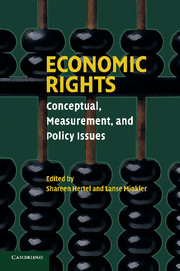Book contents
- Frontmatter
- Contents
- Contributors
- Acknowledgments
- 1 Economic Rights: The Terrain
- SECTION I CONCEPTS
- 2 The West and Economic Rights
- 3 Needs-Based Approach to Social and Economic Rights
- 4 Economic Rights in the Knowledge Economy: An Instrumental Justification
- 5 “None So Poor That He Is Compelled to Sell Himself”: Democracy, Subsistence, and Basic Income
- 6 Benchmarking the Right to Work
- SECTION II MEASUREMENT
- SECTION III POLICY ISSUES
- APPENDIX 1 Universal Declaration of Human Rights
- APPENDIX 2 International Covenant on Economic, Social, and Cultural Rights
- Index
- References
4 - Economic Rights in the Knowledge Economy: An Instrumental Justification
Published online by Cambridge University Press: 18 December 2009
- Frontmatter
- Contents
- Contributors
- Acknowledgments
- 1 Economic Rights: The Terrain
- SECTION I CONCEPTS
- 2 The West and Economic Rights
- 3 Needs-Based Approach to Social and Economic Rights
- 4 Economic Rights in the Knowledge Economy: An Instrumental Justification
- 5 “None So Poor That He Is Compelled to Sell Himself”: Democracy, Subsistence, and Basic Income
- 6 Benchmarking the Right to Work
- SECTION II MEASUREMENT
- SECTION III POLICY ISSUES
- APPENDIX 1 Universal Declaration of Human Rights
- APPENDIX 2 International Covenant on Economic, Social, and Cultural Rights
- Index
- References
Summary
JUSTIFYING ECONOMIC RIGHTS
This chapter argues that if one supports efficiency in the knowledge economy, one would also have to support economic rights. There is no consensus among scholars, philosophers, and policy makers on the justification, content, and strength of human rights. Even more intractable is the issue of whether or not economic rights exist at all. Trimiew (1997, 103–68) summarizes three strands of arguments against economic rights. First are the contentions that see an irreconcilable incompatibility between civil-political rights and economic rights. Economic rights give rise to positive obligations that may in fact infringe on the civil-political rights of others. After all, the satisfaction of economic rights entails rival consumption, because they require interpersonal transfers of real resources across economic agents. The second set of objections view the claims of economic rights as incomprehensible. For example, Cranston (1967) argues against economic rights because (a) they are culturally conditioned and therefore not truly universal, (b) they are not always of paramount ultimate value (as in the case of the oft-cited right to a paid vacation [article 24, UN Universal Declaration of Human Rights]), and (c) they are not practicable (as in the case of the right to full and gainful employment for all peoples). Finally, there are those who argue that economic rights only serve to worsen the condition they are meant to ameliorate because they may breed dependency and free-ridership.
Economic rights have been justified on the basis of both their intrinsic worth and their instrumental utility.
- Type
- Chapter
- Information
- Economic RightsConceptual, Measurement, and Policy Issues, pp. 76 - 93Publisher: Cambridge University PressPrint publication year: 2007
References
- 1
- Cited by



